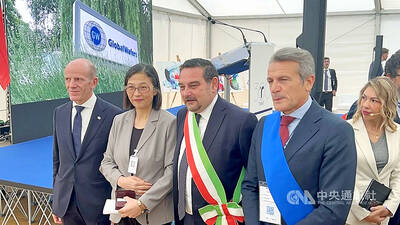The consumer price index (CPI) last month rose 0.31 percent from the same period last year on the back of lingering cigarette tax and oil price hikes, the Directorate-General of Budget, Accounting and Statistics said yesterday.
The advance is the lowest in 13 months and represented a 0.6 percent decline from October, as an abundant vegetable supply drove down prices, the agency said.
“Consumer prices held stable last month, as evidenced by headline and core CPI values,” an agency official said, dismissing concerns that consumer spending lost momentum amid a stock rout, and trade tensions between the US and China.
The easing in price levels had more to do with cheaper vegetables and oil price corrections than consumers tightening their budgets, the official said.
Prices of miscellaneous items increased the most at 1.94 percent on the back of cigarette tax hikes, the agency’s report showed.
Cigarettes cost 7.2 percent more last month compared with a year earlier, the agency said.
Medical and health expenses rose 0.89 percent due to upward adjustments for registration fees and certain drugs, it said.
Transportation and communication costs increased 0.66 percent, as the rise in oil prices more than offset rate cuts for Internet and MRT services, the agency said.
Food costs, which account for 25 percent of the inflationary reading, edged down 0.45 percent, because of cheaper vegetables and fruits, it said.
Vegetable and fruit prices declined 22.64 percent and 2.84 percent respectively year-on-year because of supply gluts, it said.
Egg prices climbed 27.99 percent, while milk products gained 3.53 percent, the agency said.
Core CPI, a more reliable inflation tracker because it excludes volatile items, grew 0.67 percent, signaling that consumer prices are rising modestly, it said.
The CPI reading after seasonal adjustments dropped 0.39 percent.
The wholesale price index (WPI), a measure of production costs for companies, last month rose 3.24 percent, easing from a revised 5.87 percent increase in October, the agency said.
Import prices gained 2.83 percent in US dollar terms, driven mainly by mineral products, it said.
Export prices posted a 0.12 percent increase in US dollar terms, as prices for mineral products moved up, but prices for machinery, TVs and other products became cheaper, the agency said.
In the first 11 months of this year, CPI rose 1.648 percent, while WPI gained 3.95 percent, it said.

RECYCLE: Taiwan would aid manufacturers in refining rare earths from discarded appliances, which would fit the nation’s circular economy goals, minister Kung said Taiwan would work with the US and Japan on a proposed cooperation initiative in response to Beijing’s newly announced rare earth export curbs, Minister of Economic Affairs Kung Ming-hsin (龔明鑫) said yesterday. China last week announced new restrictions requiring companies to obtain export licenses if their products contain more than 0.1 percent of Chinese-origin rare earths by value. US Secretary of the Treasury Scott Bessent on Wednesday responded by saying that Beijing was “unreliable” in its rare earths exports, adding that the US would “neither be commanded, nor controlled” by China, several media outlets reported. Japanese Minister of Finance Katsunobu Kato yesterday also

‘DRAMATIC AND POSITIVE’: AI growth would be better than it previously forecast and would stay robust even if the Chinese market became inaccessible for customers, it said Taiwan Semiconductor Manufacturing Co (TSMC, 台積電) yesterday raised its full-year revenue growth outlook after posting record profit for last quarter, despite growing market concern about an artificial intelligence (AI) bubble. The company said it expects revenue to expand about 35 percent year-on-year, driven mainly by faster-than-expected demand for leading-edge chips for AI applications. The world’s biggest contract chipmaker in July projected that revenue this year would expand about 30 percent in US dollar terms. The company also slightly hiked its capital expenditure for this year to US$40 billion to US$42 billion, compared with US$38 billion to US$42 billion it set previously. “AI demand actually

Jensen Huang (黃仁勳), founder and CEO of US-based artificial intelligence chip designer Nvidia Corp and Taiwan Semiconductor Manufacturing Co (TSMC, 台積電) on Friday celebrated the first Nvidia Blackwell wafer produced on US soil. Huang visited TSMC’s advanced wafer fab in the US state of Arizona and joined the Taiwanese chipmaker’s executives to witness the efforts to “build the infrastructure that powers the world’s AI factories, right here in America,” Nvidia said in a statement. At the event, Huang joined Y.L. Wang (王英郎), vice president of operations at TSMC, in signing their names on the Blackwell wafer to

Taiwan-based GlobalWafers Co., the world’s third largest silicon wafer supplier, on Wednesday opened a 12-inch silicon wafer plant in Novara, northern Italy - the country’s most advanced silicon wafer facility to date. The new plant, coded “Fab300,” was launched by GlobalWafers’ Italian subsidiary MEMC Electronics Materials S.p.A at a ceremony attended by Taiwan’s representative to Italy Vincent Tsai (蔡允中), MEMC President Marco Sciamanna and Novara Mayor Alessandro Canelli. GlobalWafers Chairwoman Doris Hsu (徐秀蘭) said the investment marked a milestone in the company’s expansion in Europe, adding that the Novara plant will be powered entirely by renewable energy - a reflection of its